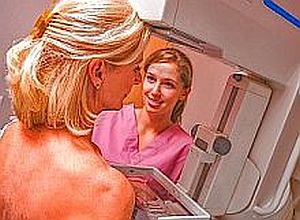A 23-year follow-up of a large UK trial found that screening women aged 40-49 led to a substantial and significant 25% reduction in breast cancer mortality in the first 10 years.
The UK, along with many other countries, has a breast cancer screening programme offering mammography to women aged 50–70 years every 3 years. However, uncertainty currently exists over whether to start screening at a younger age, including whether it might lead to over-diagnosis of breast cancer.
Between 1990 and 1997, the UK Breast Screening Age Trial randomised more than 160,000 UK women aged 39-41 to receive either annual mammography, or the usual National Health Service (NHS) breast screening which commences at age 50. The primary outcome was mortality from breast cancers diagnosed prior to first NHS breast screen.
In a new analysis, which presents the 23-year follow-up results of the trial, it was found that screening women aged 40-49 led to a substantial and significant 25% reduction in breast cancer mortality in the first ten years. The total years of life saved from breast cancer in the intervention group was estimated as 620, corresponding to 11.5 years saved per 1,000 women invited to earlier screening.
The results also suggest at worst modest over-diagnosis in this age group, and that any over-diagnosed cancers would otherwise be diagnosed at NHS screening from 50 years of age. Therefore, screening in the age group of 40–49 years does not appear to add to over-diagnosed cases from screening at age 50 years and older.
Lead researcher Professor Stephen Duffy from Queen Mary University of London said: “This is a very long-term follow-up of a study which confirms that screening in women under 50 can save lives. The benefit is seen mostly in the first ten years, but the reduction in mortality persists in the long term at about one life saved per thousand women screened.
“We now screen more thoroughly and with better equipment than in the 1990’s when most of the screening in this trial took place, so the benefits may be greater than we’ve seen in this study.”
The researchers say that more research is needed to clarify whether progress in early detection technology and treatment of breast cancer might modify the screening-related reduction in mortality in the 40-49 age group. They also did not consider the cost-effectiveness of lowering the screening age.
The study was funded by the National Institute for Health Research Health Technology Assessment programme, and included researchers from King’s College London, University of Nottingham, University of Dundee and Tel Aviv University.
In a commentary in the journal, Anthony B Miller, from the Dalla Lana school of public health at Toronto University in Canada, said the trial had not ended the debate over when to start screening. The trial did not have a control group of individuals who were not screened, he pointed out, and he was surprised that few women had been wrongly diagnosed with breast cancer – a big concern that has led to increased warnings in the leaflets given out by the NHS breast cancer screening programme.
“It could be argued that breast screening with mammography should not be initiated at any age, but rather women should be encouraged to practise breast awareness, with mammography used as a diagnostic test,” he is quoted in The Guardian as saying.
Abstract
Background: The appropriate age range for breast cancer screening remains a matter of debate. We aimed to estimate the effect of mammographic screening at ages 40–48 years on breast cancer mortality.
Methods: We did a randomised, controlled trial involving 23 breast screening units across Great Britain. We randomly assigned women aged 39–41 years, using individual randomisation, stratified by general practice, in a 1:2 ratio, to yearly mammographic screening from the year of inclusion in the trial up to and including the calendar year that they reached age 48 years (intervention group), or to standard care of no screening until the invitation to their first National Health Service Breast Screening Programme (NHSBSP) screen at approximately age 50 years (control group). Women in the intervention group were recruited by postal invitation. Women in the control group were unaware of the study. The primary endpoint was mortality from breast cancers (with breast cancer coded as the underlying cause of death) diagnosed during the intervention period, before the participant's first NHSBSP screen. To study the timing of the mortality effect, we analysed the results in different follow-up periods. Women were included in the primary comparison regardless of compliance with randomisation status (intention-to-treat analysis). This Article reports on long-term follow-up analysis. The trial is registered with the ISRCTN registry, ISRCTN24647151.
Findings: 160 921 women were recruited between Oct 14, 1990, and Sept 24, 1997. 53 883 women (33·5%) were randomly assigned to the intervention group and 106 953 (66·5%) to the control group. Between randomisation and Feb 28, 2017, women were followed up for a median of 22·8 years (IQR 21·8–24·0). We observed a significant reduction in breast cancer mortality at 10 years of follow-up, with 83 breast cancer deaths in the intervention group versus 219 in the control group (relative rate [RR] 0·75 [95% CI 0·58–0·97]; p=0·029). No significant reduction was observed thereafter, with 126 deaths versus 255 deaths occurring after more than 10 years of follow-up (RR 0·98 [0·79–1·22]; p=0·86).
Interpretation: Yearly mammography before age 50 years, commencing at age 40 or 41 years, was associated with a relative reduction in breast cancer mortality, which was attenuated after 10 years, although the absolute reduction remained constant. Reducing the lower age limit for screening from 50 to 40 years could potentially reduce breast cancer mortality.
Funding: National Institute for Health Research Health Technology Assessment programme.
Authors
Stephen W Duffy, Daniel Vulkan, Howard Cuckle, Dharmishta Parmar, Shama Sheikh, Robert A Smith, Andrew Evans, Oleg Blyuss, Louise Johns, Ian O Ellis, Jonathan Myles, Peter D Sasieni, Sue M Moss
[link url="https://www.qmul.ac.uk/media/news/2020/smd/breast-screening-women-in-their-forties-could-save-lives.html"]Queen Mary University of London material[/link]
[link url="https://www.thelancet.com/journals/lanonc/article/PIIS1470-2045(20)30398-3/fulltext"]The Lancet Oncology abstract[/link]

